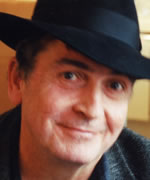Search
Rychard Carrington reports on The City Wakes: All At Once, The Happening – The Centre at St. Paul's, Cambridge 28 October 2008

For one evening The City Wakes festival stepped back from Mr. Barrett himself, and took us to the beatnik culture he inhabited in his late teen years in Cambridge, for a revival of the happenings that took place in the Cambridge Union Cellars in the mid-1960s, organised by the original movers and shakers:
‘Some friends of Syd invite you to be part of, be the art of the All at Once Happening at the Centre at St Paul's at 7.30 on Tuesday, October 28th for the conversion of the bourgeoisie. Our digipoems, mangled music & old wave films will remix prolix newkicks. Our simultaneity, multineity & spontaneity will loop back to yesterday, improvise today but furrow tomorrow. We insist you keep your mobile phones on, your children badly behaved and your antennae tuned to the chance of beauty. It's FREE to get in... Like life.'
Does that sound nostalgic? It is a strange experience, revisiting the avant-garde of the past. To what extent can it still challenge us, even still point to the future? Have we become what they were aspiring to, or were they just a forlorn lost crusade, an indulgent, irrelevant cul-de-sac, or ...?
The Raverat clan were out in force. Author and entrepreneur William Pryor (pictured) played keyboards and recited, his sister, artist Lucy Raverat, painted onstage and played a whistle, her husband, scholar of Indian religions Andrew Tomlinson, wandered on to recite sporadically. Someone else tootled free jazz trumpet in the background. But perhaps the most central figure was filmmaker Nigel Lesmoir-Gordon, a rather mild-mannered man who recited his own beat poetry. Two of Nigel's short films, one of mathematical psychedelic patterns and one of Syd and friends grooving on mushrooms in Wandlebury in 1966, played concurrently and repetitively as a backdrop, while Peter Wynne Willson's bubbling light show projected all around the hall. The overall feeling was the familiar Sixties one of meandering in newly claimed free territory, asserting a liberated William Blake-Walt Whitman-Allen Ginsberg spirituality, and implying significance in ad hoc whimsy. Well, better than what you get on television these days, that's for sure.
Audience participation was invited, but the room had been set up with a clear divide between performers and spectators, which was only crossed by a few odd individuals. Pryor asserted that the show had no end, so nobody was quite sure when to leave. Either one risked missing something worthwhile, or one spent too long witnessing an anti-climactic gradual wind-down. In general, the audience was, I think, a little unsure of how to react, possibly of what they made of it, of whether they were enjoying themselves or not. Such was always the case, probably, at such events. In truth, I think, such happenings have always relied on the conviction of both participants and audience (in practice the two groups don't merge as easily as is proclaimed) that something special is happening. Without that conviction, one might want to view only edited highlights and skip all the vague experimentation that doesn't quite go anywhere. It was one of those events whose success was hard to judge on its own terms, but which stands out as a memorably different evening, a refreshing relief from all the usual.
Did these folk in the Sixties really believe that a new culture of freedom was imminent, or even immanent? Really? Really?? Well, sober spirits could have predicted that they were never going to arrive there, and indeed they didn't. But, oh, to travel hopefully ...
But what did indeed come out of such ‘happenings' was the Sixties as we know them today - not the literal decade of actual historical experience but the hippie sensibility that has had such a bearing on our cultural development. Certainly there would have been some liberalisation without the impact of the bohemian radicals, but it wouldn't have been the same, not at all. In terms of artistic achievements, the music of Pink Floyd in the late 1960s is an example of how this very spirit of loose audacious adventure was used to create work that tightened into something very artistically satisfying.
Like the happening, this review may seem rambling and inconclusive, but that's life. And it's FREE to get out...
Writer: Rychard Carrington